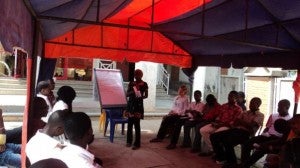This blog post was contributed by Peris Wakesho, one of the fifteen Young Champions of Maternal Health chosen by Ashoka and the Maternal Health Task Force at EngenderHealth. She will be blogging about her experience every month, and you can learn more about her, the other Young Champions, and the program here.
 During the Global Maternal Health Conference (GMHC) in New Delhi India, held from August 30th to September 1st 2010, at some point I thought maternal health (MH) was just for doctors, nurses and midwives. Then I remembered: No, I am a Young Champion, the new generation of ideas for maternal health. I am a counselling psychologist, and amongst the 15 Young Champions there are even engineers!
During the Global Maternal Health Conference (GMHC) in New Delhi India, held from August 30th to September 1st 2010, at some point I thought maternal health (MH) was just for doctors, nurses and midwives. Then I remembered: No, I am a Young Champion, the new generation of ideas for maternal health. I am a counselling psychologist, and amongst the 15 Young Champions there are even engineers!
Yes, it was time that other professionals embraced issues related to the health of mothers, during pregnancy, birth and after birth.
In my nine month placement I had a target of counselling at least 15 young people, including adolescent mothers. By January 2011, with only 4 months left to the end of the fellowship, I had only offered counselling to 14 youth! It got me thinking. While group counselling was an option, I wanted a session that would make a difference in these young people’s lives. I wanteddirect, one-on-one contact that would leave them thinking that those working on maternal health also care about other issues.
I decided to take the most senior class at INCRESE’s Behaviour Change Communication (BCC) sessions, a unique class (pictured below), for a session on career guidance andcounselling. After the session, five young people, amongst them one female, asked for follow-up sessions. On the week of the scheduled sessions I became ill and could not make it. I thought I would lose touch with these young people so when I got back to work I started making arrangements to contact them. But before I could make the first call, two of them walked in. After greetings, we rescheduled the sessions and the other three also came in during the week and we did the same.
The first, second, third and fourth sessions got me thinking. The fourth was a 19-year old lady. She finished school in 2008 and to date was not doing anything. On exploring the issue, it wasn’t just about career guidance but self esteem, duel issues that needed to be dealt with. We scheduled follow-up sessions and by the third session I began putting the pieces together. Career guidance might not come close at first thought when we talk of maternal health, but keeping girls in school longer is one way that we reduce their chances of getting married early or starting child bearing early. If girls start child bearing late, then their reproductive span and number of children will be limited. Plus, they will have increased knowledge on contraception and negotiation power since they have a career and a higher education. What this will translate to is reduction in maternal mortality and morbidity.
Alas! The puzzle fits, and in my project, as part of working with adolescent mothers and parents in Kenya, the Swahiba (Swahili for friend) clubs will also act as an avenue for a second opportunity, an opportunity to either go back to school or opt for a trade of choice. Career guidance and counselling will be a strong prevention link in the program targeting school-going adolescents, out of school adolescents, adolescent mothers, and parents as a means of promoting education for girls, contraceptives, family planning choices,and reduced abortions.
